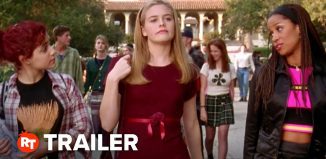Movie Review: ‘Beetlejuice’ sequel is plain nostalgia

Reviewed by Jeffrey Sanzel
The concept of objectivity in a review is nearly, if not completely, impossible. Yet reviewers often avoid using “I” in their analyses. In this case, I am breaking the rule for context: I did not see Beetlejuice (1988) until last week. I knew that viewing the original was necessary, but also felt it only fair to be forthcoming of my lack of nostalgia in connection to a film that many hold with fond memories. So, I judged a film made over thirty years ago to evaluate its sequel. End of “I.”

Photo courtesy of Warner Bros.
Beetlejuice (1988) garnered mostly positive reviews upon its release, receiving multiple nominations and a handful of awards. Tim Burton, whose previous film, Pee-Wee’s Big Adventure, had become a cult favorite, directed a script by Michael McDowell and Warren Skaaren.
Over the years, it has been labeled a “comedy classic.” Viewing it three and a half decades later, the film seems quaint and a bit creaky, not so much offbeat but slightly pressed zaniness, and almost reminiscent of The Canterville Ghost. Some design elements foreshadow Tim Burton’s later and more mature, refined visions.
Michael Keaton, as the titular demon “bio-exorcist,” Betelgeuse, appeared in a mere seventeen minutes. Beetlejuice possesses a sweetness and charm if a bit light on substance. Over the years, multiple sequel attempts (Beetlejuice in Love, Beetlejuice Goes Hawaiian) were shelved for various reasons.
Tim Burton returns to the director’s chair, this time with a screenplay by Alfred Gough and Miles Millar, and Keaton, Winona Ryder, and Catherine O’Hara reprise their original roles. The now grown-up Goth daughter, Lydia (Ryder), returns to Winter River after the unexpected death of her father, Charles Deetz.
Lydia, now host of the talk show Ghost House, struggles with her rebellious teenage daughter, Astrid (Jenna Ortega). In the attic of the Deetz home, Astrid discovers the town model and accidentally opens the portal to the afterlife.

The film contains enough plot threads for half a dozen movies, but none are fully realized. At the center is the conflict between Lydia and Astrid over Lydia’s failed marriage to Astrid’s father, Richard (Santiago Cabrera), who died in South America after the divorce. Lydia struggles with her engagement to her television producer, Rory (Justin Theroux).
Betelgeuse is hunted by his ex-wife, the soul-sucking witch, Delores (Monica Bellucci), who poisoned him before he murdered her with an axe. Another branch is Jeremy (Arthur Conti), Astrid’s love interest, who is not quite what he seems. Add to these the ghost detective, Wolf Jackson (Willem Dafoe), a second-rate action star with a new career post-life.
While this promises a rich spectrum of opportunities, the results are thin and underdeveloped. The movie oddly manages to be chaotically frenetic yet simultaneously turgid. The hundred-and-four minutes seem at least an hour longer.
There are funny spots and clever moments—an ode to the “Day-O” of the first movie, a joke involving Richard Marx’s “Right Here Waiting,” a Soul Train bit (that stays too long in the station), and even a smart Newhart reference.
The Betelgeuse-Delores history plays perfectly as a subtitled Italian Art film by way of Mario Bava. But these moments get lost among jokes belabored to the point of losing any humor.
One senses that the script meetings were mutual admiration societies in which the writers and director greeted every idea with joy and no bit left behind.
Tonally, the film is all over the place. Winter River feels less like the idyllic Mayberry of the original and more like Halloween’s dread-steeped Haddonfield. The delightful Catherine O’Hara plays a milder version of her genius Schitt’s Creek creation, Moira Rose (including a sly parody of The Crows Have Eyes 2). Ryder seems uncomfortable in the role, not sure where the teen Lydia left off and the adult began. Keaton delivers an identical performance—logically, as the character is not about growth. But most of his jokes are either gross or … well, gross.
With Sylvia Sidney’s and Glen Shadix’s passing, the film lost two of the original’s most interesting characters—Juno and Otho Fenlock. The Maitland’s—Alec Baldwin and Geena Davis—are also absent—dismissed in a single line about a loophole that freed them. While they killed off patriarch Charles Deetz (the disgraced Jeffrey Jones), his image and presence remain—first as a Claymation character, then as an image on his grave, and finally as a headless talking corpse.
The film’s major bright spot is Ortega. With shades of her Wednesday Addams, she manages to avoid sulky teenager and creates the character’s angst and frustration without losing the warmth. She is completely sincere and wholly watchable, elevating the performances around her.
Beetlejuice Beetlejuice is clearly a much-anticipated movie. Much like Barbie, many audience members wore t-shirts celebrating the “event-ness,” with Keaton’s image or catchphrases from the film or even shirts mimicking Betelgeuse’s stripes. Unlike Barbie, in the end, Beetlejuice Beetlejuice contributes little to its own—or any cinematic—history.
Rated PG-13, the film is now playing in local theaters.






